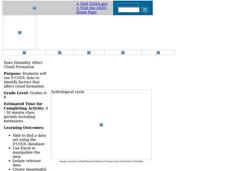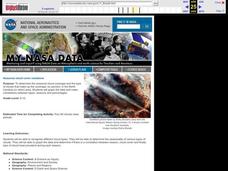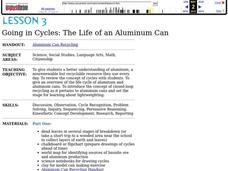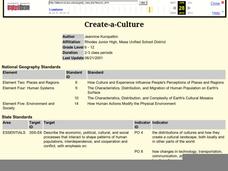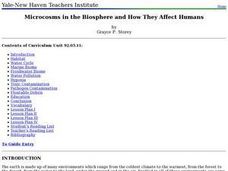NASA
Supernova Chemistry
By measuring the wavelength, frequency, and intensity of electromagnetic radiation, scientists determine the temperature, density, and composition of far away items. Scholars rotate through ten lab stations using a spectroscope at each...
Curated OER
Using the Very, Very Simple Climate Model in the Classroom
Students study the relationship between the average global temperature and carbon dioxide emissions. In this weather lesson plan students develop a test scenario using a model then read and interpret graphs of data.
Curated OER
Shake, Rattle and Roll
Learners compare the weathering of different-sized materials. Comparisons are made and data analyzed to reach conclusions about the process of weathering. Applications can be made for the higher grades.
Curated OER
Let's Take a Rock Apart
Students take a crushed rock and sort the remains of the rock minerals into different categories based on the different properties. In this sorting lesson plan, students learn what makes up a rock and how to sort something into categories.
Curated OER
Shake, Rattle and Roll
Students compare the weathering of materials. in this weathering lesson plan, students experiment with the chemical and physical weathering of different materials. Students use salt and water as an example of how weathering occurs.
Curated OER
Does Humidity Affect Cloud Formation?
Students use NASA's S'COOL database to identify factors that affect cloud formation.
Curated OER
Storm Watch: Knowing What To Do
Students study the different types of weather and how storms form. In this weather lesson students make their own "tornado in a bottle" and create brochures.
Curated OER
Seasonal Cloud Cover Variations
Learners recognize different cloud types. They determine the seaonality of various types of clouds. They graph the data and determine if a correlation exists between season, cloud cover and type of clouds most prevalent during each season.
Curated OER
Reflection and Absorption of Light
Students use a microcomputer connected to a light sensor and temperature probe to explore the reflection and absorption of radiation for different surfaces. Students follow instructions in this guided inquiry based lab and are then asked...
Curated OER
Going in Cycles: The Life of an Aluminum Can
Students investigate the manufacture of aluminum cans and consider the energy and resources saved when the cans are made from recycled material. They explore the concept of closed-loop recycling using charts, worksheets and discussion.
Curated OER
Going in Cycles: The Life of an Aluminum Can
Students explore the life cycle of aluminum cans. In this recycling lesson, students review the manufacturing process and how to make a closed loop cycle. Students also have the opportunity to present what they've learned to others...
Curated OER
Panther Scavenger Hunt
Young scholars examine the Florida Panthers through a Web-quest. For this web-based lesson, students find clues that will help them to identify the habitat of the Florida Panther and the history of human activity which threatens these...
Curated OER
Create-a-Culture
Students examine the different characteristics of culture and write about a hypothetical culture of their own.
Curated OER
Scarcity of Land Throughout the World and in Hawaii
Students discuss the importance of "land." They review the four types of land classification--urban, rural, agricultural and conservation--and participate in an activity involving an apple that demonstrates the use of land in Hawaii....
Curated OER
Where Am I, and How Do I Get Where I am Going?
Students describe geographical places through art, music, writing, and math. They compile information in booklets which may be published.
Curated OER
Science: Microcosms in the Biosphere
In a series of lessons, examine the impact on humans by microcosms in the biosphere. Among the plans structured for students with different abilities and learning styles, are activities describing the symbiotic relationship, drawing the...
Curated OER
Location, Location, Location: Civilization's Ultimate Advantage
Students discover how geographical advantages, locational and regional, ultimately led to western Eurasian societies' disproportionate accounting of world power and innovation. They utilize a workbook which can be downloaded within this...
Curated OER
Salt: White Gold
Students examine the importance of salt for trade routes and the economy of a community.
Curated OER
Where in the world is the Hydra Electron?
Walk your class through the journey water takes once it leaves your kitchen sink, all the way through the water cycle. Demonstrations support your lecture. This plan is thoroughly written, but ideally you would follow it up with water...
University of Colorado
Phases of Charon
Charon, the largest of Pluto's moons, was discovered in 1978. Lesson is a walk through of how to solve for the phases of Charon. It uses two different points on Pluto and takes into account the tilt of the pole, the rotational axis, and...
Curated OER
How Mountains Shape Climate
Pupils use raw data to make a climatograph; they explain the process of orographic precipitation and the concept of a rain shadow.
Curated OER
Theobroma - Food of the Gods
Students discuss the history of cacao and its use in the production of chocolate. They analyze actual cacao pods and record their observations. Finally they create a five minute contour drawing of the cacao pod and seeds.
Curated OER
Shake, Rattle and Roll
Students explore how to locate the location of an earthquake and why earthquakes happen more frequently in some areas more than others.







